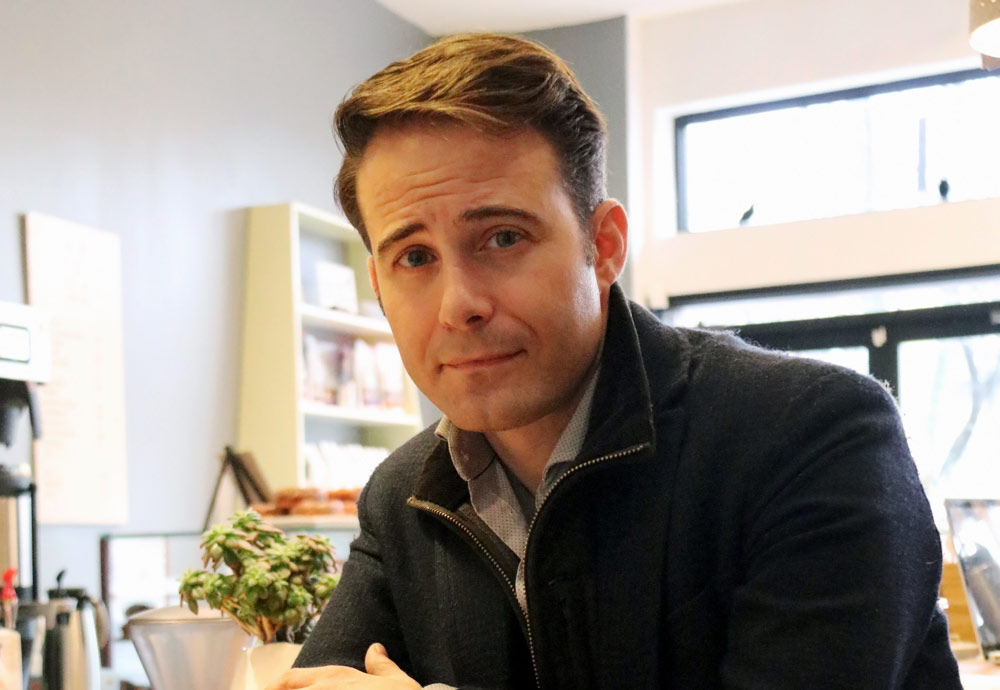Neighborhood Watcher
WNBC’S investigation reporter Chris Glorioso is always on the move—whether he's checking government spending or squeezing in a morning workout.

Chris Glorioso can't help but notice things big and small, from his friendly Montclair neighbors and new businesses in town to legislative votes and campaign lawn signs from bygone elections. This 40-yearold township resident and father of two always keeps his eyes in focus and ears in tune—all for the public. Those are, after all, the traits of a watchdog journalist and investigative reporter.
In an exclusive interview with Morris/ Essex Health & Life, Glorioso, a member of the NBC 4 New York I-Team investigative unit and seven-time Emmy award winner, discusses the stories that benefit taxpayers, staying fit while on a stakeout and why Lois Lane was the real superhero of the Superman comic strip.
What makes the I-Team special?
We all come to the table with different specialties and backgrounds. I specialize in public finance and exposing government waste. For example, I did a story about the NJ Treasury Department inexplicably writing off tens of millions of dollars in fines and debts owed by big energy companies. We fought for records and showed that, in some instances, the government was forgiving these fines without reason. If a resident doesn’t shovel a sidewalk, they pay a personal fine. But the government was forgiving debts owed by big companies. Taxpayers were outraged, and the Treasury isn’t writing off as much now as it once did.
Does the public need more investigative reporters in general?
This region would be much better served if every TV station could have a team like ours; we help keep the system honest. For example, there was one story where we were able to take the camera and show New Jerseyans a vote in Trenton when the legislature was already on a break. We found staffers of state legislators, who came back for the vote, pushing the button and voting instead of the legislators themselves. There’s proof in the pudding: Viewers saw us on the statehouse floor confronting the staffers who shouldn’t be voting on a bill. There’s no way to think that was fake news.
But you almost left journalism about 10 years ago. What happened?
I was a local reporter in 2007–08 covering credit defaults and swaps, mortgage derivatives and things that, frankly, I knew little about. It was so daunting when I realized that I had the responsibility to explain very complex issues to millions of people—and I was questioning whether I was getting it right. What I needed was more expertise and time to research topics, and I wasn’t getting it.
What made you stay with the profession?
WNBC rang the doorbell and said, “Don’t leave journalism yet.” They developed this I-Team which would be given more time to research important issues. I was skeptical at first: Were they really going to give me three months to research a story, or were they going to say, “We need you to do a story on what Lindsay Lohan is wearing.” Well, I haven’t done any stories on Lindsay Lohan, and I’ve been given three months to do stories.
“We don't have super powers—we're just irregular people who are very curious."
What kind of responses have you received after your stories?
People can sense when you’ve worked hard. They’re not in the newsroom with you while you burn the midnight oil, but when you call them in the morning and tell them, “Hey, look what I found out,” they figure out that you’re not a nine-to-fiver and they’re grateful. I actually have people come up to me on the street and thank me.
How do you find balance between your home and work lives?
I never turn the email off, but I do leave the phone on my desk at home when I’m playing with the kids. Family is always first, and because the 6 p.m. news is when my stories typically air, I’m able to spend the mornings with my family. I cherish that time and try not to look at the day’s emails until I’m done with that part. I also have my amazing wife, Alison, and we use Google calendar. We’re definitely a modern family that uses technology to make sure we are keeping dates, make sure we don’t forget we need a baby sitter and go out, relax and have dinner. We like to go to MishMish, a really good Turkish restaurant in town.
Work can take a toll on one’s health. How do you stay fit?
I often find myself on a stakeout, sitting in a car eating food from a gas station—not ideal for one’s fitness. But I try to ward off the health consequences with two very modest routines. One, I do at least 75 pushups every morning right after I brush my teeth. It takes less than 2 minutes. Second, I always ride my bike at full sprint to the bus or train. I don’t care if it’s snowing and I’m wearing a 3-piece suit. “I don’t have time” isn’t an excuse, because the bike actually saves time.
You’ve been in Montclair for about a year. What are your go-to places?
Local Coffee is a place I go to every morning to try to gather my thoughts. Sometimes I get completely wrapped up in a story, and that could be an impediment to thinking clearly. A café like that is a great place to come to have a cup of coffee, think and give me 10 minutes where I’m not answering phones and emails. As a dad of two kids, the Turtle Back Zoo is an amazing place. I can sit there for hours and watch the monkeys. As a parent, it’s as fascinating to you as your kids.
Did you work on your high school newspaper?
I did not—I’m not even sure my high school had a paper. It wasn’t until I went to Syracuse University that I thought about going into journalism. I started on the college radio station, and my first job was at WSYR radio, an AM news station. Radio makes you a better writer because you don’t have the benefit of pictures. I put a lot into my writing, because what good is it if a great story is broadcast but nobody watches it through to the end? I tell my interns to treat their story like a term paper: research, outline, edit.
Who’s your favorite fictional journalist?
I wouldn’t say Clark Kent but maybe Lois Lane. She didn’t have super powers, but her strengths were her passion and personality. As an investigative journalist, people want to talk to you; they wouldn’t mind sitting down and having a beer with you. I like to think that someone wouldn’t mind having a beer with me, and that means they trust me enough to talk to me about my next investigation. Lois Lane had charisma, and people wouldn’t mind having a beer or coffee with her. We don’t have super powers—we’re just regular people who are very curious.

